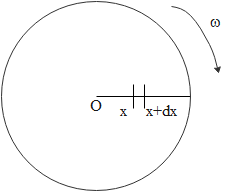Question
Question: A copper disc of radius 0.1m rotated about its center with 10 revolutions per second in a uniform ma...
A copper disc of radius 0.1m rotated about its center with 10 revolutions per second in a uniform magnetic field of 0.1 tesla with its plane perpendicular to the field. The e.m.f induced across the radius of disc is:
A. 10πvolt B. 102πvolt C. π×10−2volt D. 2π×10−2volt
Solution
E.m.f induced in case of a rotating circular disk is given as ∈=2Bωr2, where B is the magnetic field, ω is the angular frequency and r is the radius of the disc.
Formula used:
E.m.f is given as
∈=2Bωr2, where ω=2πυ
Complete answer:
In this question, we have a copper disc (a good conductor of electricity) having radius 0.1m. It is rotating with a frequency of 10 revolutions per second and is placed in a magnetic field of 0.1T perpendicular to the plane of disc. Therefore we have the following parameters available with us.
r=0.1m υ=10sec−1 B=0.1T
The formula for calculating the induced e.m.f is given as
∈=20.1T×2π×10sec−1×(0.1m)2
Solving this equation, we get
∈=π×10−2volt.
So, the correct answer is “Option C”.
Additional Information:

The formula used to calculate e.m.f can be derived as follows: Consider a small radial segment dx on the circular disc and the distance of this segment from the centre of the disc is x. Since the disc is moving with angular velocity ω, the velocity of disc is given as ωx. Therefore, we can calculate e.m.f across this segment as follows:
d∈=vBdx=ωxBdx
Integrating both sides, we get
∫d∈=ωB∫xdx ⇒∈=Bω2x2
This is how we obtain the formula for e.m.f. It is simple to remember and can help in understanding the concept better.
Note:
1. All units should be in the same system of units.
2. We notice that flux is not exactly changing for this rotating disc so e.m.f should be zero according to Faraday’s law. But that is not the case, this is where Lorentz force comes into action. It acts on the charge carriers moving inside the disc.
